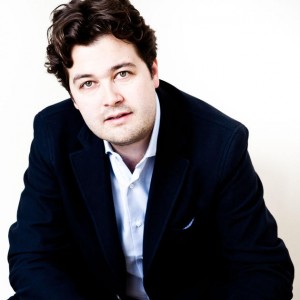London Philharmonic Orchestra, Power, Jurowski, Royal Festival Hall (Review)
 Nothing follows Mahler 6 and surely nothing should precede it. Nothing. Even a piece as compelling as James MacMillan’s Viola Concerto here receiving its World Premiere under the extraordinary fingers of its dedicatee Lawrence Power. There’s only so much intensity and so many notes we can take on board in a single concert and I, for one, wonder if the experience of the MacMillan did not colour our perception of, even compromise our response to, Vladimir Jurowski’s Mahler. It didn’t help, of course, that many of us will always associate this darkest night of Mahler’s soul with this orchestra – the London Philharmonic – under one particular conductor: Klaus Tennstedt. His live Prom performance from 1983 (now enshrined on disc) remains perhaps the single greatest performance I have ever heard of the piece. In this context the words “follow that” were always at the back of my mind.
Nothing follows Mahler 6 and surely nothing should precede it. Nothing. Even a piece as compelling as James MacMillan’s Viola Concerto here receiving its World Premiere under the extraordinary fingers of its dedicatee Lawrence Power. There’s only so much intensity and so many notes we can take on board in a single concert and I, for one, wonder if the experience of the MacMillan did not colour our perception of, even compromise our response to, Vladimir Jurowski’s Mahler. It didn’t help, of course, that many of us will always associate this darkest night of Mahler’s soul with this orchestra – the London Philharmonic – under one particular conductor: Klaus Tennstedt. His live Prom performance from 1983 (now enshrined on disc) remains perhaps the single greatest performance I have ever heard of the piece. In this context the words “follow that” were always at the back of my mind.
But violist Lawrence Power’s extraordinary championship of the gift James MacMillan has given him might well prove to be the solo performance of the year – and it’s only January. MacMillan is such a natural communicator and from the two simple chords ushering in Power’s rhapsodic opening solo the compulsion to go where he led was a given. For a Scottish Catholic the tone of this solo – indeed much of the solo part – was (as the serendipity of the pairing would have it) hauntingly Hebraic, almost as if Bloch’s Shelomo now had a son and heir. But it was MacMillan’s fantastic ear for orchestral sound that turned his largish orchestra into an environment in which his soloist could hold court and shine and always be heard. Pitting the gruffly assertive and astonishingly virtuosic pyrotechnics of the solo part against equally virtuosic tuned percussion was one way – chesty ardour offset by sparkling iridescence above. Another was through the soloist’s affecting alliance with pairs of violas and cellos or solo strings. Or simply by counterpointing the fast moving solo part with slow moving and highly characteristic plainchant in the wind.
MacMillan’s innate theatricality (he and Mahler both) made for a gripping slow movement where indomitable brass chords and the roar of tam-tam cleared the floor for the soloist’s rapt song. This most songful, hymn-like, writing incorporating the scoops and swoops and catches of an emotive vocalise eventually arrived at an unforgettable “evaporation” of the song in shortening phrases so high and so barely voiced as to sound like they were no longer emanating from the instrument at all.
That kind of beauty seemed to filter through (almost by a process of osmosis) into Jurowski’s Mahler 6 where all the lasting memories came with repose. So it wasn’t the bone-rattling march (incisive xylophone playing) of the first movement but its rarefied still centre that was transfixing. Peace in the face of terrible anxiety. Rarely has a bass clarinet sounded more consoling than here.
But maybe the balance of the performance – as in more beauty than brawn – was further upset by Jurowski’s choice of the Andante/Scherzo ordering of the middle movements. The issue has been endlessly debated, of course, but the cold, clear, fact is that the scherzo is so obviously a distorted mirror-image of the first movement that to opt for the “soft” option contrast of the Andante is to completely undermine the impact of what Mahler originally intended. I do believe he lost his nerve when he switched the order of these inner movements. The return to A minor and more remorseless goose-stepping was about as daring a juxtaposition as Mahler had ever attempted; it was asking a lot of an audience – and anyway, all the evidence suggests that he eventually thought better of it and chose to restore the original order.
Ironically, the grimly parodistic nature of Jurowski’s Scherzo – full of startling apparitions in the trios (grunting basses, lolopping horns) – would have redoubled its effectiveness in close proximity of the first movement. Even though long pauses between movements tend to dilute harmonic relationships anyway.
Make no mistake, there was much to admire in this performance – Jurowski’s clarifying ear (many textural revelations) and the majestic playing of the LPO, tirelessly impressive (especially given the programme) in every department (what a star the first trumpet Paul Beniston is). But the terrible reality of this piece is fortitude in the teeth of despair and the strenuous ride to the abyss that Tennstedt once gave us never really materialised in Jurowski’s more dispassionate reading. Too much head, not enough heart. And the other reality that we now have to up the risk factor if works like this – which still sounds so disarmingly “modern” – are to stop us in our tracks.
You May Also Like

A Conversation With MAUREEN LIPMAN
12/10/2014
COMPARING NOTES: Musical Theatre Stars @ Pizza Express Live Holborn
28/01/2020
